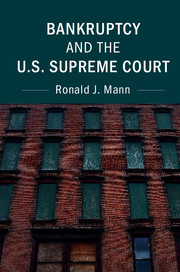Book contents
- Frontmatter
- Contents
- List of Figures
- List of Tables
- Preface
- Introduction
- PART I SETTING THE STAGE
- PART II THE HARD CASES
- SECTION A MISSED OPPORTUNITIES: CONGRESS, THE COURT, AND THE BANKRUPTCY CLAUSE
- SECTION B INTERPRETIVE STRATEGY: THE COURT, THE SOLICITOR GENERAL, AND THE CODE
- PART III AMICI AND THE COURT
- PART IV CONCLUSION
SECTION A - MISSED OPPORTUNITIES: CONGRESS, THE COURT, AND THE BANKRUPTCY CLAUSE
Published online by Cambridge University Press: 04 May 2017
- Frontmatter
- Contents
- List of Figures
- List of Tables
- Preface
- Introduction
- PART I SETTING THE STAGE
- PART II THE HARD CASES
- SECTION A MISSED OPPORTUNITIES: CONGRESS, THE COURT, AND THE BANKRUPTCY CLAUSE
- SECTION B INTERPRETIVE STRATEGY: THE COURT, THE SOLICITOR GENERAL, AND THE CODE
- PART III AMICI AND THE COURT
- PART IV CONCLUSION
Summary
I start with a section about the breadth of Congress's enumerated power “To establish … uniform Laws on the subject of Bankruptcies throughout the United States.” Although the case studies underscore the Court's hesitancy to give a broad reach to that power, the point is neither that the text of the Clause compels any particular answer to the cases that the Court has confronted nor that any historical practice provides strong guidance. Rather, I explore the extent to which the Court's cases involving the Code consider the possibility that the Court should give any weight to the framers’ decision to provide an explicit enumeration of Congress's power in the area.
Early cases had suggested that Congress had all but plenary power under the Clause. So, for example, when the Panic of 1837 drove Congress (in the 1841 Act) to break sharply with tradition by introducing a discharge without the permission of creditors, Justice Catron forcefully concluded that “all intermediate legislation, affecting substance and form, but tending to further the great end of the subject – distribution and discharge – [is] in the competency and discretion of congress.” Similarly, two generations later, when the Court faced legislation that forced secured creditors to accept reorganizations that altered their rights in their collateral (then known as “compositions”), the Court had no trouble in concluding that congressional enactments in the area would pass constitutional muster. As Jim Rogers explains, the Court settled by the time of the Great Depression on the view that “the principal source of substantive limitations on bankruptcy legislation is the bankruptcy clause itself, and hence the constitutionality of a statute adopted under the bankruptcy clause depends only on whether the measure falls within the scope of the powers conferred by the bankruptcy clause” (Rogers 1982, 998).
When it came to the Bankruptcy Code, however, the Court took a sharp and skeptical turn. The Court's critical perspective was evident from its first three encounters with the Code, in which it considered various aspects of the transition from the Act to the new Code.
- Type
- Chapter
- Information
- Bankruptcy and the U.S. Supreme Court , pp. 39 - 41Publisher: Cambridge University PressPrint publication year: 2017



